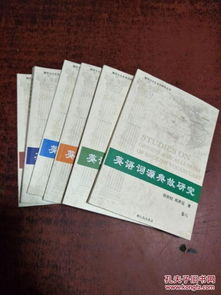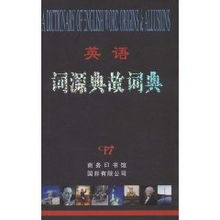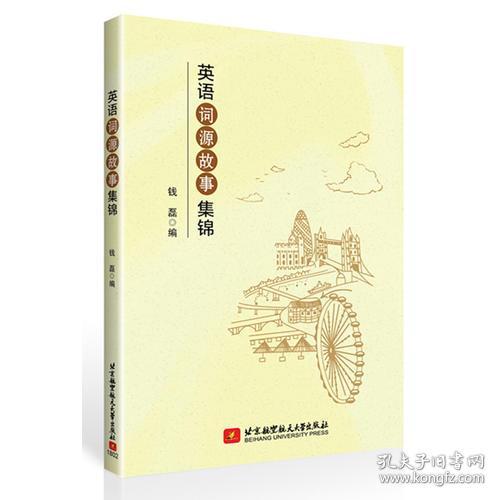英语词源典故(求!!!至少含100个词根的英文故事,3q)
1.求!!!至少含100个词根的 英文故事,3q
给你三篇,你选一篇吧. The Old Cat An old woman had a cat. The cat was very old; she could not run quickly, and she could not bite, because she was so old. One day the old cat saw a mouse; she jumped and caught the mouse. But she could not bite it; so the mouse got out of her mouth and ran away, because the cat could not bite it. Then the old woman became very angry because the cat had not killed the mouse. She began to hit the cat. The cat said, "Do not hit your old servant. I have worked for you for many years, and I would work for you still, but I am too old. Do not be unkind to the old, but remember what good work the old did when they were young." 【译文】 老猫 一位老妇有只猫,这只猫很老,它跑不快了,也咬不了东西,因为它年纪太大了。
一天,老猫发现一只老鼠,它跳过去抓这只老鼠,然而,它咬不住这只老鼠。因此,老鼠从它的嘴边溜掉了,因为老猫咬不了它。
于是,老妇很生气,因为老猫没有把老鼠咬死。她开始打这只猫,猫说:“不要打你的老仆人,我已经为你服务了很多年,而且还愿意为你效劳,但是,我实在太老了,对年纪大的不要这么无情,要记住老年人在年青时所做过的有益的事情。”
A man was going to the house of some rich person. As he went along the road, he saw a box of good apples at the side of the road. He said, "I do not want to eat those apples; for the rich man will give me much food; he will give me very nice food to eat." Then he took the apples and threw them away into the dust. He went on and came to a river. The river had become very big; so he could not go over it. He waited for some time; then he said, "I cannot go to the rich man's house today, for I cannot get over the river." He began to go home. He had eaten no food that day. He began to want food. He came to the apples, and he was glad to take them out of the dust and eat them. Do not throw good things away; you may be glad to have them at some other time. 【译文】 一个人正朝着一个富人的房子走去,当他沿着路走时,在路的一边他发现一箱好苹果,他说:“我不打算吃那些苹果,因为富人会给我更多的食物,他会给我很好吃的东西。”然后他拿起苹果,一把扔到土里去。
他继续走,来到河边,河涨水了,因此,他到不了河对岸,他等了一会儿,然后他说:“今天我去不了富人家了,因为我不能渡过河。” 他开始回家,那天他没有吃东西。
他就开始去找吃的,他找到苹果,很高兴地把它们从尘土中翻出来吃了。 不要把好东西扔掉,换个时候你会觉得它们大有用处。
The City Mouse and the Country Mouse Once there were two mice. They were friends. One mouse lived in the country; the other mouse lived in the city. After many years the Country mouse saw the City mouse; he said, "Do come and see me at my house in the country." So the City mouse went. The City mouse said, "This food is not good, and your house is not good. Why do you live in a hole in the field? You should come and live in the city. You would live in a nice house made of stone. You would have nice food to eat. You must come and see me at my house in the city." The Country mouse went to the house of the City mouse. It was a very good house. Nice food was set ready for them to eat. But just as they began to eat they heard a great noise. The City mouse cried, " Run! Run! The cat is coming!" They ran away quickly and hid. After some time they came out. When they came out, the Country mouse said, "I do not like living in the city. I like living in my hole in the field. For it is nicer to be poor and happy, than to be rich and afraid." 【译文】 城里老鼠和乡下老鼠 从前,有两只老鼠,它们是好朋友。一只老鼠居住在乡村,另一只住在城里。
很多年以后,乡下老鼠碰到城里老鼠,它说:“你一定要来我乡下的家看看。”于是,城里老鼠就去了。
乡下老鼠领着它到了一块田地上它自己的家里。它把所有最精美食物都找出来给城里老鼠。
城里老鼠说:“这东西不好吃,你的家也不好,你为什么住在田野的地洞里呢?你应该搬到城里去住,你能住上用石头造的漂亮房子,还会吃上美味佳肴,你应该到我城里的家看看。” 乡下老鼠就到城里老鼠的家去。
房子十分漂亮,好吃的东西也为他们摆好了。可是正当他们要开始吃的时候,听见很大的一阵响声,城里的老鼠叫喊起来:“快跑!快跑!猫来了!”他们飞快地跑开躲藏起来。
过了一会儿,他们出来了。当他们出来时,乡下老鼠说:“我不喜欢住在城里,我喜欢住在田野我的洞里。
因为这样虽然贫穷但是快乐自在,比起虽然富有却要过着提心吊胆的生活来说,要好些。”。

2.求英语词源
去买一本。
我有一本电子书的PDG的英语词源,平时我是用WEBSTER来查的。/还有这个摩西英语的网站我非常喜欢。
例如preamble 前言、序文、绪论、导言、开场白等(星期五) 2010-03-26 amble [] vi.(马)缓行、从容漫步,n.(马的)缓行步态、漫步,如句子:He ambled around the park他在公园里漫步;funambulist [] n.走钢丝(或绳索)的杂技演员(或艺人),拉丁词根fun表示绳子,所以字面意思就是“someone walking on a rope”,呵呵,提心吊胆的悬在半空中,可没有多少“fun乐趣”可言呀;ambulance [] n.救护车,因为一般都配备有应急医疗设施,所以顾名思义,救护车就是就是能“行走”的一个“流动医院”;noctambulant [] adj.夜间步行的、梦游的、夜游的,拉丁词根noct表示夜晚,实际来自希腊词根nyct,同样表示夜晚、黑夜、黑暗。在希腊神话中,黑夜女神叫Nyx(罗马神话中叫做Nox),传说她住在沉重的铁块也需要九天九夜才能掉到底的冥府最深处,唯一的职责就是当白昼之神Hemera返回时自己升到地面上,给世界带来无边的黑夜;值得说的是,preamble首字母大写时特指美国宪法的前言,全文是:We the People of the United States, in Order to form a more perfect Union, establish Justice, insure domestic Tranquility, provide for the common defence,promote the general Welfare, and secure the Blessings of Liberty to ourselves and our Posterity, do ordain and establish this Constitution for the United States of America我们合众国人民,为建立更完善的联邦,树立正义,保障国内安宁,提供共同防务,促进公共福利,并使我们自己和后代得享自由的幸福,特为美利坚合众国制定本宪法。
今日名言 Reprove your friend privately, commend him publicly---Solon,ancient Greece statesman and poet.私下批评朋友,公开赞扬朋友---梭伦,古希腊政治家和诗人。

3.英语习语来源于历史典故有哪些?
情人节(Valentine's Day)
瓦伦丁
270年2月14日 罗马圣教徒瓦伦丁被处死,此日被后人定为“情人节”
瓦伦丁节,又称情人节,是欧美和大洋洲的一些国家的民族节日。此节日的来源甚多,但一般是以罗马圣教徒瓦伦丁被处死,后被定为“情人节”较为普通。
公元3世纪,罗马帝国出现全面危机,经济凋敝,统治阶级腐败,社会动荡不安,人民纷纷反抗。贵族阶级为维护其统治,残暴镇压民众和基督教徒。是时有一位教徒瓦伦丁,被捕入狱。在狱中,他以坦诚之心打动了典狱长的女儿。他们相互爱慕,并得到典狱长女儿的照顾。统治阶级下令将他执行死刑。在临刑前,他给典狱长女儿写了一封长长的遗书,表明自己是无罪的。表明他光明磊落的心迹和对典狱长女儿深深眷恋。
公元270年2月14日,他被处死刑,后来,基督教徒为了纪念瓦伦丁为正义、为纯洁的爱而牺牲自己,将临刑的这一天定为“情人节”,希望有情人终成眷属。
4.英文单词背后的故事
《赢在单词》一书指出:词汇、语音和语法是构成语言的三大要素。
其中,词汇是思维概念的基本单位,也是语言的基本构成单位,掌握好一门语言首先必须掌握一定量的词汇。如何学好英语单词,能够以较少的精力、较快的速度、较好的效果来大量识记英语单词,迅速扩大词汇量,这与有效的学习方法有密切关系。
希腊、罗马神话和《圣经》是西方文化的重要组成部分,其影响已渗透到整个西方社会的各种意识形态领域,对英语的发展同样产生重大影响,尤其是英语词汇的发展。 另外,很多英文单词与中国成语一样,来源于某些典故,在英语里,从地理和时间的名称、科技术语,到日常对话、文学作品等,源于这些典故的词汇、短语和习语比比皆是。
如果我们能够了解这些单词背后的故事,那对我们记忆它是有很大帮助的。 (1)神话派生词: ①Hygeia → hygiene 单词hygiene卫生(学)/保健(学)来源希腊神话人物健康女神Hygeia,此神是位年轻的姑娘,身披白色长衣,头戴祭司冠好似护士一般。
她的父亲是医神Aesculapius,经常拿着带有巨蛇盘缠的手杖,手杖象征着知识、权威,蛇象征医学,所以蛇和手杖已成为国际通行的医药卫生标志。 ②Muses → museum 单词museum博物馆来源希腊和罗马神话人物缪斯The Muses的神殿Mouseion。
在古希腊和古罗马的神话中,宙斯与记忆女神生有九个女儿,她们后来成了艺术与科学诸神,负责向艺术家和科学家提供灵感。她们统称为缪斯The Muses,每位缪斯属司一门艺术或科学。
她们住在奥林匹斯山上,她们嗓音甜美,能预见未来,她们的神殿称为Mouseion,博物馆museum 此词就来源于此。 ③Oceanus → ocean 单词Oceanus大海/海洋来源希腊神话人物海洋之神奥西娜斯Oceanus,环绕地球的外部海域的泰坦神,为所有海洋女神和河神之父。
他头上生有牛角,尾巴环绕地球。 ④Tantalus → tantalize 单词tantalize 惹弄/逗引来源希腊神话人物丹达罗斯Tantalus,此神因泄漏天机,被罚在齐下巴的水中,头上有棵果树,口渴欲饮时,水即流失;腹肌欲食时,果即被风吹去,好似有惹弄/逗引此神之意,故引申出此词来。
⑤Vulcan → volcano 单词volcano火山来源希腊神话人物中铁匠兼火Vulcan,此神的妻子是美神Venus,后来美神Venus红杏出墙爱神了战神,还生下爱神丘比特。但是由于火神不是战神的对手,只好忍气吞声,躲在地底下打铁。
某日,他胸中怒火和炉火一起被喷发出来,情景如同火山爆发一样壮观,故引申出此词来。 (2)典故派生词: ①bank 河岸/银行 单词bank来源于拉丁语bancus,原本是指“平坦的东西”,后来在英语中,河、海旁平坦的地方就叫bank河岸,而平坦的木制长凳则叫bench。
传说耶稣到耶路撒冷以前,圣殿前面有一排兑换钱币的商人,在他们面前通常会有一张长凳,上面放着钱币,因为bench是bank的变体,所以人们便把摆放钱币的bench写出bank,此后,经营钱币买卖的地方。就叫bank银行。
②bigwig 要人/名人/权贵/大亨 在18世纪的欧洲,上流社会中的人们通常都戴假发(wig假发)。一些人戴的是短假发,但国王、贵族、法官和主教戴的是长而飘垂的假发,显示地位高贵。
在当时,地位越高,假发越大越长。后来,人们就把要人、权贵们称为bigwig了。
不过,现在人们有时用它来调侃那些故意装出绅士风度摆出官架子的人。 ③cocktail鸡尾酒 此词是美国独立战争时在纽约州韦斯切斯特县一家小酒馆里问世的。
发明此酒的人,就是在此酒馆工作的一位侍女,名叫贝特西·弗拉纳根。她从一只大公鸡的尾巴上拔下一根毛,用它来搅匀几种掺在一起的酒。
当时有一群军官来酒馆喝酒,贝特西给他们送上此酒时,军官当中有位法国人举杯用法语喊了一声“鸡尾万岁!”,此词由此而来。 ④January 一月 传说古意大利门神简洛斯Janus有两张脸,一张脸在前,展望未来;一张脸在后,回首过去。
所以就以他的名字来命名“一月”,表示辞旧迎新。 ⑤news 新闻 据说,在报纸未发明出来之前,人们通常将新闻张贴在公共场所的专栏上,专栏顶部分别写着“N”、“E”、“W”、“S”(分别代表:north 北、east东、west西、south南),北方发生的事记在“N”栏,东方发生的事记在“E”栏,西方发生的事记在“W”栏,南方发生的事记在“S”栏,于是此词就这样产生了。
《赢在单词》一书中指出:如何理解“记忆单词最科学、合理、有效、快速、实用的方法即探源珐”这句话? 答:也许许多人会对这个书名提出疑问,这本书有那么好吗?用那五个词来形容探源法是不是有些夸张?你的方法有英语国家权威专业人士编著的有关词汇学学习丛书中所讲的方法科学吗?你的探源法所探源的东西有词源词典编著的合理吗?你的探源法有我把世界最顶级的词汇记忆大师聚在一块专门教我一人更有效吗?你的方法在快有人家一个月倒背如流《牛津高阶英汉双解词典》那位朋友快吗?你的方法在实用有我到国外零距离学习英语词汇更实用吗? 我的回答是:是,没有! 我所用的五个词是把它们作为一个整体来形容探源法的,单独拿出来一个词肯定都有它的弊端,但是能把这五个词权衡其。
5.英语词汇中有哪些有趣的词源
1. Quarantine['kwɔrən'tin] 检疫;隔离
这个单词来自法语中的qarante,即40(有道君当初被法语的数字虐得简直人生无望,好好的80,非要说成两个40)。以前,某艘进港的货船若是被怀疑有传染病,会被拒绝登岸40天。
2. Jumbo['dʒʌmbəʊ] 巨大的,巨型的,特大的
这个单词最初源自于一种西非语言,意为大象。在1860年,伦敦的动物园的一头大象被命名为Jumbo之后,这个词就开始有巨大的意思。这头大象是阿拉伯贩子从非洲捕获的,后来倒手卖给了欧洲的动物收购者。
3. Hazard['hæzɚd] 危险;危害
源自阿拉伯语"al zahr",意思为骰子。恩,看来古时候的人就知道赌博不好。
4.Lukewarm[,lʊk'wɔm] 缺乏兴趣的;不热情的;冷淡的
lukewarm指微温的,但在GRE考试中一般是指不关心的。在中世纪英语中luke就是warm的意思,所以lukewarm其实是“warm warm”。
6.英语的历史故事
简单极了
One summer, cao cao led troops to crusade against zhang embroidery, was hot, scorching sun, the sky a cloud also have no, troops in the winding mountain path to walk, on both sides of the thick forest and the hot rocks the sun, let a person to breathe. By noon the soldiers clothes are wet through, the speed of the marching slowed down, there are several individual weak soldiers unable to breathe. Cao cao see the marching speed more and more slow, worry about delay aircraft, the in the mind is very anxious. But, single sip of water can not drink, how can speed up? He immediately called the guide and asked him: "is there any water nearby? The wizard shake to say: "spring in the side of the valley, to bypass the past and a long way." Cao cao thought for a while and said, "no, time too late." He took a glance at the woods, and thought for a moment and said to the guide: "you don't say anything, I'll find a way out." He knew that now even if ordering his troops to speed up the speed also of no help. Brains on turn, the way to, he a clip horse belly, fast arrive to the front of the queue, pointing to curb ahead with said: "soldiers, I know there is a large merlin front, where the plum is big and good, and we hurry up ahead, around the hill went to merlin!" The soldiers, listen and seemed to eat into his mouth, spirits, and to help speed up the pace of the many.
7.英语词源是什么,
词源,英语叫 etymology. 是一个词汇的来龙去脉。
举例:
英文有个单词 是 dim sum 是点心的意思。来自于中文。词典里的词源如下。
Chinese (Cantonese) dim sem
汉语(广东话) dim sem
from Chinese (Mandarin) [light refreshments]
源自 汉语(普通话) [松软点心]
dim [spot, drop]
dim[少许,微量]
xin [heart, center]
xin [中心]
英语中有个词汇叫 tycoon,巨头:富有的、强有力的商人或工业家;大亨
词源如下:
Japanese taikun [title of a shogun]
日语 taikun [日本幕府将军的头衔]
[of Chinese origin]
[起源于汉语]

声明:本网站尊重并保护知识产权,根据《信息网络传播权保护条例》,如果我们转载的作品侵犯了您的权利,请在一个月内通知我们,我们会及时删除。
蜀ICP备2020033479号-4 Copyright © 2016 学习鸟. 页面生成时间:0.126秒